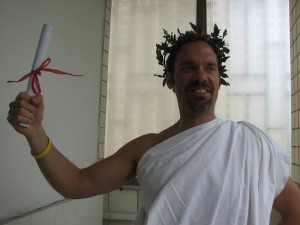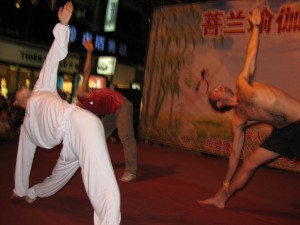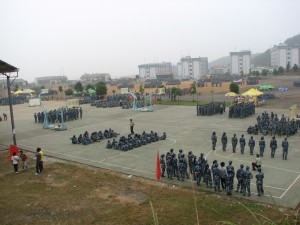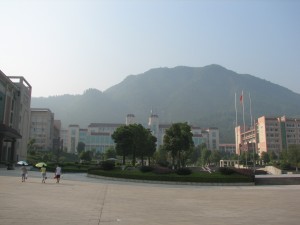Traditional Chinese Medicine & Elizabethan Theatre
 With 16 teaching hours per week and a four day weekend it seemed that I had an abundance of free time. There were no office hours required, but I provided nine hours during evenings throughout the week for students wanting to talk about literature, culture, or life. It had to be evenings because the studentry were in classes all day long, day after day. But despite this I was practically on sabbatical.
With 16 teaching hours per week and a four day weekend it seemed that I had an abundance of free time. There were no office hours required, but I provided nine hours during evenings throughout the week for students wanting to talk about literature, culture, or life. It had to be evenings because the studentry were in classes all day long, day after day. But despite this I was practically on sabbatical.
I had the free time to get literary, practice yoga, explore grimy Chenzhou, and plan my upcoming Tibet expedition. I contacted the Xiangnan University medicine school faculty to meet with them for a tour of their facilities, and learn about the Chinese health care system. It would make for another podcast. And I researched online. Research was the first step to finding out what I wanted to learn and explore.
Before I contacted the medicine school, I acquainted myself with Traditional Chinese Medicine (TCM). The internet enabled me to consult the starry forest of the night, and find homeostatic balance between yin and yang, anima and animus.  The stars aligned and those who had the sight could decipher them and see the interrelationship between the macrocosmos and the microcosmos. I felt chi flow around me, through me. But I was not a Jedi yet.
According to the horosopic principles of TCM, my prognosis was bright: I had one year to live. Thereon, I would slough off my Chinese life and return to America. There was only one remedy for this condition: carpe diem every hour as needed.
But I spent 20 hours each week plotting and planning my literature and drama classes. This meant re-reading texts, creating power points, writing outlines for each class and devising theatre games. Between it all I answered student emails and wrote this. At any one time there was 3-5 open word documents at various stages of composition and revision.  Then I had to write class notes for the students because, as the vice dean told me, “Chinese students aren’t used to working on their own.â€Â I kept forgetting that I was in a communist country.
Students knew they were very lucky to have me. I transmuted the classroom into a Roman forum and a street in Verona. I was versed in the incantations of the dead poets, and their magic words of time traveling. And seriously, who in their right mind ever strode into class dressed in a toga and a laurel wreath crown to bury Caesar, not to praise him? Or wore a bed sheet cape, and wielded a bamboo sword in a duel with Tybalt–that rat-catcher!–which was actually just the podium? Or raised the roof of the English Department and slammed down Vachal Lindsay’s “The Congo” while pacing the aisles like a tyger burning bright shape-shifting into a hoodoo witchdoctor conjuring up King Leopold’s tortured ghost?–just to make a point that poetry was meant to be read aloud?

And I supplemented their textbook. I was certain that I had the only complete set of Norton Anthologies in Chair Mao’s home province. I xeroxed whole novels and poems never seen nor heard west of Wuhan or south of Shaolin. This was a necessary evil. As an English major from the College of William and Mary I had poetic license, and was in constant communion with the dead poets. As their ambassador I knew they would want this—corporate profits and copyright laws be damned. We adhered to laws that transcended such artifice. That and then the nearest foreign book store was in Hong Kong. Students couldn’t afford extra books and wouldn’t buy them if they could. So the greater good depended on a Xerox machine. And I worried that maybe I had read too much of Mao’s Little Red Book.
My Chinese counterpart sat behind a desk, read from the government issue-textbook, and told students what to memorize. Her real Chinglish name was not Bee-Bee. We had met during the first week of school. Students had told Bee-Bee that I was a very funny but serious foriegn teacher. But she was upset that I did not segregate the American and British authors. Furthermore, I had committed heresy when I had begun the semester with the Romantics instead of starting with a synopsis of Beowulf or a fragment of Chaucer. She wanted to cobble me. She wanted to ensure that my class was compliant with government regulations. This was the first time anybody in China tried to cramp my style. Most Chinese I had met, including the dean and other communist party members, were very enthusiastic about my ideas. After reading my syllabus, the vice dean emailed me to say that my class would be very good for the students and that he wished other teachers followed my example. So I found Bee-Bee’s reaction puzzling. For this member of the old guard, learning was not about the process, but rather all about the final exam.   In the end, I asked her if it would be convenient for her to teach my classes and maybe I could be her student. Despite her lingual puissance she couldn’t answer the question, and stormed out of the office without even a zai jian.

Some students dropped my class after the first day because they were worried I would not teach them how to define a Shakespearean sonnet. They were afraid that I would withhold this information. But maybe there was something else. Surely it had to be deeper than that. Maybe learning English from a capitalist roader would jeopardize their prospects for finding a government job as an English teacher? Whatever the case, they were very gracious in their emails, and praised me as a “serious teacher” that would provide a more interesting and useful class than the Chinese version. But alas, they had to take the rote-learning version because their careers were at stake. I apologized right back at them so sorry I could not be like their Chinese teacher, that as an ignorant foreign devil I only knew how to teach English literature in a style used in places like Harvard or Cambridge. Then I wished them luck on their journey to becoming open-minded English teachers.
Chinese English majors had one year of literature, but most came into my class acquainted with the Big Authors. By their junior year they’ve already read excerpts from Shakespeare, Jane Austen, and Earnest Hemingway.  They can even recite their birth dates.  But they could not tell you what they liked or disliked about certain texts. And seldom had they ever read a full text–even Romeo & Juliet–let alone laughed aloud in class. I actually experienced an English teacher’s greatest pleasure in a Chinese classroom this fifth week of school: I heard students laugh at all the puns the Cobbler throws in Flavius’s face in the opening scene of Julius Caesar. And afterward I showed students how to find free full online texts on line (i.e. Project Gutenberg and Bartleby)–just in case they became life-long learners or they needed the dead poets when the time came.
Despite all this, the students realized that if the Chinese Century was truly happening then they needed to learn how to innovate rather than imitate. Free thinking would help them in this endeavor. But they were stuck in a rut laid down by traditional Chinese teachers. This bell jar contained all their dreams and aspirations. I generalized too much, but this was my gut feeling corroborated by foreign teachers with years of service abroad. And students both here and in the more cosmopolitan east coast cities expressed similar sentiments in conversations and emails. There was nothing for me to do but encourage students to read and participate in class. I helped them learn to ask questions and seek answers, to teach them how to turn inconvenience into convenience, difficulties into challenges, lead into gold, and realize they were the heroes of their own stories.

Expat life may seem enviable, but the greatest treasure of all was our freedom. In China I was becoming more American than I could ever have been in America. Here foreigners were so free to individuate. You re-created your Self. You reflected and transformed. There were no pigeon holes here. Chinese either expected foreigners to act like Hollywood or lacked expectations altogether. Act crazy and Chinese would think that was normal laowai behavior. Act like a film star and they would think that was normal too—as you were behaving in accordance with the exemplary decorum sanctioned by the U.S. government’s mass media bureau.
Speak and everybody listens—and if you messed up your lines, it didn’t matter because it was the gist that counted, and nobody spoke your language anyway. Act and everybody watched. All the world was a stage, but China was the only place in the world where your show would sell out with demands for an encore.
Freedom was free. But it was deadly as well. You re-created your Self or you destroyed it. All the hedonism and decadence that was ethically or financially prohibitive in America could be had for part time employment and a full time salary in China. It was an easy road with deep ruts running through a dark wood.
That was the path of my neighbor. Gee taught classes while exuding alcohol. Or missed them altogether.  He accosted and wrangled cell phone numbers from women students who just wanted to practice their oral English. He played the dirty old man archetype. This shade drifted through China from job to job. Gee’s mantra was not, “There’s no place like home,†but rather “There’s nothing back home.†Sometimes late at night you can hear him cry havoc and unleash the snarling wardogs upon his Self, “I hate my life. I hate my life. I hate my life.â€Â It was iambic hexameter. After each line there was pregnant pause as if he waited for an answer from the netherworld. But when nothing happened he resumed his screams. When I first heard this it sounded like Trashcan Man’s diabolic chant to Randall Flagg, “My life for you, my life for you: my—life—for—you.â€
One night after dinner with some other laowai, I knocked on his door to see how he was doing. We had invited him, but sometimes he forgot to come. And Gee got mad when you reminded him. “Sounds like he has Tourette’s,” another teacher had said. But this night bedlam raged again behind the door. I knocked once more and there was silence. The door opened.
Alcohol and second-smoke assaulted my olfactory. That’s when I knew I had stumbled into a troll’s den. I felt compulsions to wash my hands with hot soapy water, and cleanse my nostrils and gargle with saline. I wanted to turn invisible. Gee fixed his crazy China blue eyes on me. He had grown a goatee since the first day I met him. Now he was calm and collected and asked me what’s up. He was flying casual. A Nirvana guitar riff played in quiet fury in the living room. Everything was hazy from chain-smoking. There was a Romance of the Three Kingdoms poster on his door with the word “KEYS!!!” slashed across it in bold black magic marker. Rotten meat was also on his breath. Food, empty liquor bottles, and cigarette butts littered the floor. Maybe if I kept him talking the sun would rise and he would turn into stone before he could eat me.
I played the stupid teenager in a slasher film and walked in. We talked about our classes and on this strange other world called China. He said he was embarrassed about his messy place. I preserved the harmony: Oh yeah, my place was messy too. You know how it was. Sometimes we teachers were just too busy to take care of ourselves. And as we talked he ran bloody knuckles under a faucet. Rust colored spots streaked nicotine-stained wall tiles. After a while I thought that perhaps he was lonely, crying for help. Now he was okay.  And there wasn’t a body crammed into the nooks and crannies of his dorm.
So satisfied I thought that he just needed somebody to talk to. He needed a friend. So I was there for him but it was getting late. And I had classes first thing in the morning. I told him goodnight and took another shower before going to bed. And he resumed his banging and screaming while I brushed my teeth and washed my face. Something had switched inside his head. Later I found out these nocturnal episodes kept another teacher who lived upstairs awake.
Apparently I found a new role to play. I had been playing Mr. Keats for the students. Now I played Patch Adams for Gee. I got him to talk about his drinking and the life he had left behind in America. It was the story of a downward spiral of love, loss and self-destruction. There was a woman he had met. This pair of star crossed lovers was a match made in paradise. But things changed.  They got lost during the journey. Somebody started drinking a little more than usual. There was financial strain. Somewhere else in the world a butterfly flapped its wings. There was Wall Street. Then there was a tempest. Suddenly greed was maybe not so good. And shit rolled down hill. Years later they realized the garden had withered into a desert. And they were well on their way to becoming the sick thing all children fear most.

Gee stopped. Now it was a good time forget about woes and we ranted about cruelty and told tyranny to fuck off. Then we declared our independence. We revolutionaries were not just ready to fight, we were ready to die. It would be a short happy life at the foot of Fairy King Mountain. But then Gee regressed. He recited a litany of complaints. It was all because of China. He looked into his bathroom mirror. It was cratered with fist-sized spider-webbed cracks.  He saw himself reflected million times and told me how crazy China really was.
Gee didn’t need a friend. He needed psychotherapy and a shit load of prescription drugs. He also needed a straight jacket. Having none of these things I could only offer him Socratic Method: Instead of quitting cold turkey, could he cut back by degrees so that perhaps in a month or two his drinking could be manageable? What would he do differently if he had a second chance?
I didn’t know what would become of him. He lingered in his room surfing the internet for a new ESL job. Hopefully he would begin the long march out his infernal prison cell.
But this was the truth and beauty of being in China: That at least as a foreigner you have both the free time and the freedom to be human and discover the humanity in others.
One Comment
Pingback: